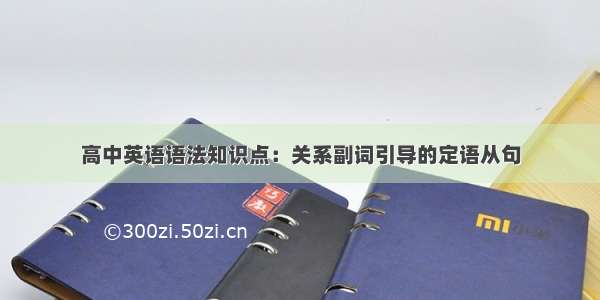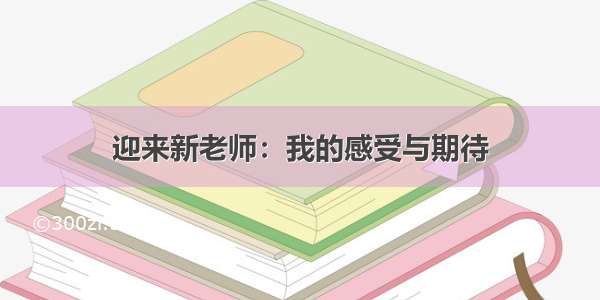
2、作宾语
The noodles (that)I cooked were delicious. 我煮的面条美味可口。(引导词that,可省略)
The fish(which) we bought wes not fresh. 我们买的鱼不新鲜。(引导词which,可省略)
3、作定语
关系代词whose在定语从句中作定语用。
This is the boy whosemother is our Chinese teacher. 这就是那个男孩,他母亲是我们的语文老师。
注意:关系代词whose在从句中与它所修饰的词一起作介词宾语时,可以跟介词放在主语和从句之间。
The boss in whosecompany Mr. Kang worked called at the hospital. 老板到医院拜访了康先生,康先生在他的公司里工作。
4、作状语
关系副词where, when和why在定语从句中分别作地点状语、时间状语和原因状语。
Ill never forget the time whenwe worked on the farm. 我将永远不会忘记我们在农场工作的那段日子。
The factory wherehis father works is in the west of the city. 他父亲工作的那个工厂在城市的西部。
This is the reason whyhe came late. 这就是他来晚的理由。
That和those可作定语从句的先行词,但this和 these不能,同时,在作先行词时,只有those可指人,试比较:
(对) He admired that which looked beautiful.
(对) He admired those who looked beautiful.
他赞赏那些外表漂亮的人。(those指人)
(错) He admired that who danced well.
(that作宾语时不能指人)
(对) He admired those who danced well.
他赞赏跳舞好的人。(those指人)
(对) He admired those which looked beautiful.
他赞赏那些外表漂亮的东西。(those指物)
二、关系代词的用法work
英语中的关系代词有who,whom,whose,which,that和as。它们的用法如下:
1、who,whom的用法
who和whom指人,who在定语从句中作主语;whom在定语从句中作宾语,在限制性定语从句中可省略。在口语中可用who代替whom。
In the beginning, people whobought the tomato often got angry. 起初,买到西红柿的人常常会生气。(作主语)
The person(whom)you should write to is Mr. Ball. 你应该给他写信的人是波尔先生。(whom作宾语能省略)
His mother, whomhe loved dearly, died in 1818. 他很爱你的母亲,她于18去世了。(whom引导非限制性定语从句,作宾语但不能省略)
2、whose的用法
whose 指人或物,在定语从句中作定语,指物时常可用of which取代。
I have a friend whosefather is a mayor. 我有个朋友,他父亲是市长。
We lived in a housewhose window faces south. 我们住在窗口朝南的房子里。
3、which 的用法
which指物,在定语从句中作主语和宾语,作宾语时,在限制性定语从句中可省略。
They needed a plant whichdidn need as much water as rice.他们需要一种不像水稻那样需要水的作物。(作主语,不能省略)
It is used to record the tickets (which) passengers buy.它用来记录乘客所购买的车票。(作宾语,可以省略)
He came late, whichwe all know. 我们都知道,他来晚了。(作宾语,在非限制性定语从句中不省略)
4、that 的用法
that 多指物,有时也指人,在定语从句中作主语或宾语,指物时其用法和which大致相同,但也有区别。
All the people thatcome from the country work much harder. 所有来自农村的人工作都更努力。(that指人,在从句中作主语,不能省略)
She is the only person(that) I can trust. 她是我唯一可以依赖的人。(that指人,在从句中作宾语,可以省略)
5、关系代词that和which的区别
(1)相同点
The train that ( which )has just left is for Shanghai.刚开的那列火车是去上海的。(作主语)
The film that(which)we saw last night is wonderful.我们昨天晚上看的电影好极了。(作宾语,可省略)
(2)用that,不用which的情况
①当先行词是不定代词all, one, few, little, everything, nothing,any, anything, little等不定代词或被它们修饰时。
Is there anythingthat I can do for you?
He answered few questions thatthe teacher asked.
②当先行词被形容词最高级或序数词修饰时。
This was one of the most interesting books thatwere sold in this book store.这是这家书店售出的最有趣的书之一。
③当先行词有the very,the only,the same等修饰时。
That’s the only thing thatwe can do now.目前我们只能这样了。
Those arethe very words thathe used.那就是他的原话。
They were talking aboutthe persons and things that they saw in the factory.他们在谈论在工厂里看到的人和事。
China is not the countrythat it was.中国已经不是过去的中国了。
⑥当要避免与疑问词which重复时。
Which is the car that was made in Beijing?哪辆车是北京制造的?
⑦当先行词为the way, the time, the period等时,关系代词常用that,但通常被省略。
I don like the way(that)you speak to her.我不喜欢你对她说话的方式。
(3)用which,不用that的情况
①引导非限制性定语从句。
Football, whichis an interesting game, is played all over the world.全世界都踢足球,它是一项有趣的运动。
②直接放在介词后作宾语时。
Language is the most important tool withoutwhichpeople can communicate with each other.语言是最重要的工具,没有它,人们便无法交流。
6、关系代词who与that的区别
(1)当先行词是he、people、those,elder等时,引导词常用who。
He who does not reach the Great Wall is not a true man. 不到长城非好汉。
Those whoare for me, put up your hands. 同意我的人请举手。
(2)当引导词作定语从句的表语时常用that。
She isn the little girl thatshe used to be. 她再也不是过去的那个小姑娘了。
He is the man that I asked for help yesterday.他就是我昨天求助的人。
7、as的用法
(1)as引导限制性定语从句通常构成such...as或the same...as固定搭配,as在从句中可作主语、表语或宾语。
Many of the sports were the same asthey are now.过去的许多运动项目同现在的一样。(作表语)
Don’t read such books asare not worth reading. Read such books as you can understand.不要读那些不值得读的书,只去读那些你能读懂的书就可以了。
He lent me as much money ashe had.她把所有的钱借给了我。
(2)such…that…与such…as
“such…that…”表示“如此……以致……”的意思,用来引导一个结果状语从句;而“such…as…”表“像……这样的……”的意思,用来引导定语从句,as在从句中充当主、宾或表语等。
He is such an honest man that we respect him.他是一个如此诚实的人以至于我们都尊敬他。
He is such an honest man as we respect.他像我们所尊敬的这种诚实的人。
(3)the same…that…与the same as
“the same…that…”表同一人或物,而“the same…as…”表同种类的东西。试比较下列两个句子:
This is the same book thatI lost.这就是我丢失那本书。(指同一本书)
This isthe same book as I lost.这本书跟我丢失那本书一模一样。(并不是原来的那一本)
(4)as 引导非限制性定语从句
as作关系代词,还可用来引导非限制性定语从句,可以用来代替一个句子或单词,as引导的句子可放在句首、句末或句中。
The moon, as is known to everybody, travels round the earth once every month.
As is known to everybody, the moon travels round the earth once every month.
英语中的关系副词有where,when,why等。
1、when的用法
when指时间,修饰表时间的先行词,在定语从何中作时间状语。
July and August are the monthswhen the weather is hot. 七八月是天气很热的月份。
2、where的用法
where指地点,修饰表地点的先行词,在定语从句中作地点状语。
She will go home whereshe can rest. 她要回家了,在家里她可以休息。
注意:先行词为表示时间、地点的名词时,关系词不一定都用when或where。如果关系词在定语从句中作主语或宾语,就要用关系代词whch或that。
This is the factory that/which we visitedlast year.这是我们去年参观的那家工厂。
I won forget the time that we spentin the countryside.我永远不会忘记我在农村度过的那段时光。
3、why的用法
why指原因,修饰名词reason,在定语从句中作原因状语。
This is the reason whyhe did so. 这就是他这样做了的理由。
Do you know the reason whyhe left early?你知道他为什么早走吗?
“介词+关系代词”的结构是一较为复杂的问题,初学英语者对此往往感到棘手。因此,下面仅就几种常见的“介词+关系代词”的结构浅析如下。
1、介词+which在定语从句中分别作时间、地点和原因状语
介词+which在关系分句中分别作时间,地点和原因状语,代替相应的关系副词when,where和why。
I still remember the dayon which (=when)I first came to school.我仍然记得初来学校的那一天。
The factory in which (=where)I work is a large one.我工作的工厂是一个大厂子。
This is the reason for which(=why)he was put in prison.这就是他为什么被关起来的原因。
2、介词+which(指物)/whom(指人)在定语从句中作地点状语
介词+which(指物)/whom(指人)在关系分句中作地点状语,表示存在关系,关系分句主谓常须倒置。
They arrived at a farm house in front of whichsat a small boy.他们来到一处农舍,前边坐着一个小孩。
I saw a man, on the head of whom stood a bird.我看见一个人,他的头上站着一只鸟。
3、不定代词或数词+of+which(指物)/whom(指人),在定语从句中作主语
不定代词或数词+of+which(指物)/whom(指人),在关系分句中作主语,说明整体中的部分。
China has a lot of islands, one of whichis Taiwan.中国有许多岛屿,其中之一是台湾。
There are a lot of students here,none of whomlike the film.这里有许多学生,他们之中无人喜欢这个电影。
4、介词+which(指物)/whom(指人),在关系分句中作目的、方式或地点状语
Could you tell me for whom youve bought this coat?你能告诉我这件衣服是给谁买的吗?
5、介词+which(指物)/whom(指人),用于被动结构的关系分句中,作状语,说明动作的发出者。
The wolf by which the sheep was killed was shot. 伤害羊的那只狼被打死了。
The man by whom the wolf was shot was a good hunter. 打死狼的那人是一个好猎手。
6、名词+of which,代替whose+名词,在关系分句中作定语。
I saw some trees, the leaves of which (=whose leaves)were black with disease.我看见一些树,它们的叶子因生病而发黑。
He mentioned a book, the title of which (=whose title )Ive forgotten.他提到一本书,书的名我忘了。
7、介词+which(指物)/whose(指人),修饰后边的名词。
The driver was the man from whose room she had stolen the maps.司机就是她从他的房间偷走地图的那个人。
比较:介词+which+不定式。此种用法多见于正式文体中,相当于一个带有主语和谓语的定语从句。
She had only 1.87 with which to buy(=she could buy)Jim, her husband, a present.她只有一元八角七分钱,用这些钱给他的丈夫吉姆买一件礼物。
At last he had something about which to write (=he could write)home. 他终于有给家写信的内容了。
1、限制性定语从句
定语从句分限制性定语从句和非限制性定语从句两种。限制性定语从句为先行词不可缺少的定语。如果将这种定语从句省去,主句的意思就会不完整或失去意义。这种从句和主句的关系十分密切,写时不用逗号分开。
She has found the necklace that she lost 2 years ago. 她找到了两年前丢失的项链。(限制性定语从句)
This is the man who came to see you yesterday.这就是昨天来看你的那个人。(限制性定语从句)
It happened at the time when I left the office.这件事发生在我离开办公室的时候。
2、非限制性定语从句
非限制性定语从句和主句的关系不十分密切,只是对先行词作附加的说明,如果去掉,主句的意思仍然清楚。这种从句和主句之间往往用逗号分开,一般不用that来引导。
Yesterday, I met Li Ping,who seemed to be busy. 昨天我遇见了李平,他好像很忙。(非限制性定语从句)
In Britain, which has a population of 55. 8 million,110,000 people die from smoking each year. 英国有5580万人口,每年有11万人口死于吸烟。(非限制性定语从句)
Abraham Lincoln, who led the United States through these years, was shot on April 14, 1865 at a theatre in Washington, D. C. 领导美国人民经历了这些年的亚伯拉罕·林肯1865年4月14日在华盛顿的一家戏院被枪杀。(非限制性定语从句)
3、限制性定语从句与非限制性定语从句的区别
(1)形式上不同
非限制性定语从句在书写时往往用逗号和主句分开,而限制性定语从句不用逗号与主句分开。
Last night I saw a very good film,which was about the Long March.
The man whom I met in the street was a driver.
(2)可否省略的不同
限制性定语从句是先行词在意义上不可缺少的定语,如果去掉,主句的意思就不完整或失去意义,而非限制性定语从句是对先行词作的附加说明,即使去掉,主句的意思仍然完整。
I was the only person in my office who was invited.
They set up a state of their own, where they would be free to keep Negroes as slaves.
(3)关系代词的不同
非限制性定语从句不能用that代替who,whom和which,并且关系代词在非限制性定语从句中作宾语时也不能省略,但在限制性定语从句中却恰恰相反。如:
This is the best film (that) I have ever seen.
She sang a new song, which we liked very much.
(4)翻译方式不同
She is the nurse who looks after the children.她就是照料这些孩子的阿姨。
This note was left by Xiao Wu, who was here a moment ago.这个条子是小吴留的,她刚才到这儿来过。
比较:
He has a brother, who lives in Beijing.(有一个哥哥。)
He has a brother who lives in Beijing.(可能有几个哥哥,其中一个是住在北京的。)
4、as与which在非限制性定语从句中的用法区别
as和which作为关系代词都可以用来引导非限制性定语从句,指代整个主句所表达的内容,在从句中作主语或宾语,但它们在用法上是有区别的,这一点许多学生往往搞不清楚。现就它们引导非限制性定语从句时的用法简述如下:
(1)相同之处
当从句位于主句之后,引导词指代整个主句所表达的全部意义时,as和which可以互换。
The elephant is like a snake, as/which everybody can see.热和人都看得出,这头大象像条蛇。
He is an Englishman, as/which I know from his accent.他是一个英国人,那时我从他的口音上知道的。
①as引导非限制性定语从句时,位置比较灵活,可位于主句之前,也可位于主句之中或之后,而which引导非限制性定语从句只能位于主句之后,不能谓语主句之前。
Robert is good at languages, as we all know. 罗伯特擅长学语言,这我们都知道。
As is known to all, China will be an advanced and powerful country in 20 or 30 years’ time. 都知道,再过二十到三十年,中国将成为一个强大先进的国家。
Air, as we know, is a gas. 我们知道,空气是一种气体。
注意:as引导非限制性定语从句常有“如同……那样”的含义,因此在一些固定结构如as we know/as is known to all(众所周知),as we all can see(正如我们大家都能看到的那样),as has been said before/above(正如前文所述),as has been pointed out(正如所指出的那样),as might be imagined(可以想象得到),as might be expected(正如所预料的那样),as is often the case(情况常常是这样)等中,一般不能用which代替as。
②搭配上,在由the same或such所修饰的名词后通常用as作关系代词引出限制性定语从句。
I have got into the same troubleas he (has).我遇到了与他一样的麻烦。
Ive never heard of such a moving story as he is telling.我从未听过像他讲得那么有趣的故事。
③which引导的从句在意义上相当于一个并列句,可以用and this代替,意思是“这件事”;as引导的从句主要起连接上下文的作用,表达说话人的观点、看法,并指出主句内容的根据或出处等。例如:
He sold his bicycle, which surprised me. (=He sold his bicycle, and this surprised me.)他把自行车卖了,这使我感到奇怪。
As is known to all, China is the country with largest population in the world. 众所周知,中国是世界上人口最多的国家。
④当which在从句中指代的是先行词本身而不是主句时,不可用as代替which。
The apple tree, which I planted last year, has not borne any fruit.这棵苹果树是我去年种下的,还没有结出任何果实。
The book, which I bought yesterday,is very instructive.我昨天买的那本书很有教育意义。
⑤在从句中作主语时,which既可作系动词be的主语,也可作实义动词的主语,而as只可作系动词be的主语。
He married her, which was natural.(可用as代替which)他和她结婚了,这是很自然的事。
He saw the girl, which delighted him. (不可用as代替which)他见到了那个女孩,这使他很高兴。
He was late for class again, which made the teacher very angry. (不可用as代替which)他上课又迟到了,这使老师很生气。
⑥as引导的从句在意义上不可与主语相悖,而which引导的从句则不受此限制。例如:
Mummy treats me like a baby, which I can bear.妈妈把我当小孩看待,这使我不能忍受的。
The result of the experiment was very good, which we hadn expected.试验结果很好,这是我们没预料到的。
The weather turned out to be very good, which was more than we could expect.天气证明很好,这我们没预料到。
1、当先行词是way意为:方式、方法,时引导定语从句的关系词有三种情况:1)in which 2)that 3)不填。
Tell me the way (不填;in which; that)you came here.告诉我你是怎么来的。
2、当先行词是time意为:次数,时引导定语从句的关系词有两种情况:1)不填 2)that。
This is the first time I have been here.这是我第一次来这里。
3、当先行词是one of+复数名词时,定语从句的谓语动词用复数。
He is one of the students who were praised yesterday.他是昨天受到表扬的学生之一。
4、当先行词是the (only) one of+复数名词时,定语从句的谓语动词用单数。
He is the only one of the students who was praised yesterday.他是昨天唯一受到表扬的学生。

![[神马语法]高中版:高考英语语法突破-定语从句知识梳理(6)](https://300zi.50zi.cn/uploadfile/img/7/654/c0874d77b0d71aafc75607d3a3f80a05.jpg)














